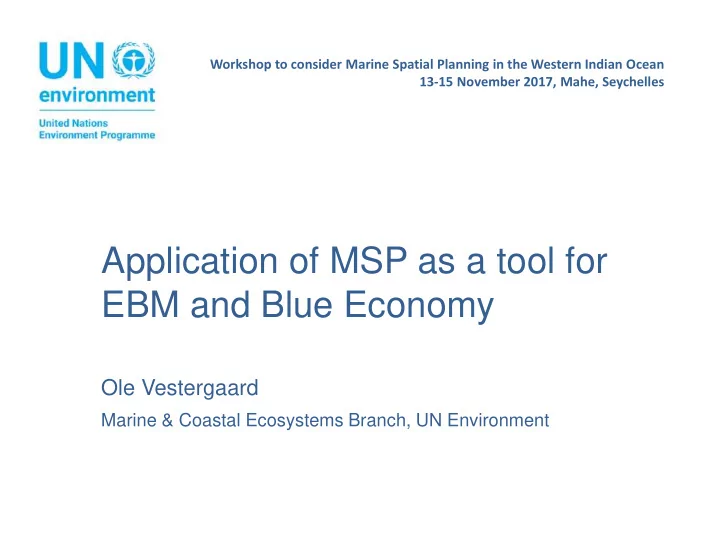

Workshop to consider Marine Spatial Planning in the Western Indian Ocean 13-15 November 2017, Mahe, Seychelles Application of MSP as a tool for EBM and Blue Economy Ole Vestergaard Marine & Coastal Ecosystems Branch, UN Environment
Workshop to consider Marine Spatial Planning in the Western Indian Ocean 13-15 November 2017, Mahe, Seychelles OUTLINE: 1. Role of oceans for human well-being & blue economies 2. Status of oceans and human impacts 3. Tools for ecosystem-based spatial planning 4. Steps forward
Healthy ocean’s provide wide-ranging services to people Recreational Key nursery Clean water opportunities habitats Nutrient recycling Carbon sink Sustainable fisheries Rich biodiversity underpinning resilience
Healthy functional ecosystems support livelihoods and income US$3 trillion per year = Global market value of marine and coastal resources and industries (5% of global GDP) (World Ocean Assessment, 2015) Gross marine product in Western Indian Ocean (334 bn/yr) : PRIMARY ASSETS Marine fisheries USD 135 bn Mangroves USD 43 bn Coral reefs USD 18 bn Seagrass USD 21 bn ADJACENT ASSETS Productive Coastline USD 93 bn Carbon Absorption USD 24 bn (WWF 2017)
Healthy oceans contribute to most SDGs
- and yet, marine and coastal ecosystems decline globally due to human impacts Direct human impacts • Unsustainable fisheries • Pollution – marine litter, nutrients, wastewater • Coastal development, e.g. tourism • Offshore infrastructure development • Mining, oil and gas exploitation Climate change impacts • Ocean warming • Acidification • Sea-level rise
The combined effect of human impacts rapidly deteriorate oceans and coasts Overfishing Overfishing + agriculture Overfishing + agriculture + development
Ecosystem-based management for sustainable development • Supports sustainable resource use for ‘blue economies’ • Uses natural capital information in cross-sector policy-making • Considers people part of the ecosystem • Manages for multiple sector objectives • Addresses cumulative impacts • Tackles marine issues at the right ecological scale − work across national boundaries
Vision for Marine Spatial Planning in the 2030 Agenda “Make spatial planning and area-based management a common, practical approach to blue economies and sustainable development…” • Use interdisciplinary sciences for better policy-making and management, e.g. strengthen socio-economic analysis • Plan for local context -- ‘No one size fits all’ • Combine single-sector and multi-sector area-based approaches • Advance cross-border use of MSP, ICZM and MPAs • Harmonize legal and regulatory frameworks across borders • Ensure full benefit-sharing among stakeholders • Develop practical trade-off analyses for realistic planning • Use risk-analysis and investment scenarios for private sector engagement
Achieving SDGs through cross-sector cooperation and regional coordination - responding to countries needs
Practical tools & capacity building for MSP and EBM for sustainable development UN Environment capacity building: • Innovative planning tools • Training and pilot demonstration • Policy guidance • Communicating practical lessons EXAMPLES: – Taking Steps Towards EBM – MSP in Practice Initiative – MPA Governance – Blue Planning in Practice (with GIZ / ‘Blue Solutions’) – Area-based management to deliver ocean-related SDGs (with EC)
UN Environment EBM framework Introduces EBM core elements and practical steps to getting started Supports planners and decision- makers across sectors for integrated management Outlines 3-phase approach to EBM development: • Visioning • Planning • Implementation
Workshop to consider Marine Spatial Planning in the Western Indian Ocean 13-15 November 2017, Mahe, Seychelles Thank you Ole Vestergaard Marine & Coastal Ecosystems Branch, UN Environment
Strategic messages on blue economy and sustainable development - Investing in healthy oceans and coastal through management and governance provides good return and contributes to national economies and development. On the other hand, insufficient investment in ocean management generates environmental liabilities and costs. - Public policy actions need to carefully account for the full value of goods and services from ‘blue capital’, communicate to the public and planners, and prepare sustainable approaches to planning coastal development. - Public engagement in ocean issues will underpin public policy responses, in turn leading to new and improved systems for ocean governance that support blue economies, healthy oceans and humanl well-being.
Strategic messages on blue economy and sustainable development - Marine investments require careful and knowledgeable planning in order to make sure that investments support sustainable development pathways. - The creation of a possible ‘Blue Economy Development Framework’ could facilitate the active participation of a spectrum of governments, multilateral development organizations, the private sector and civil society to ensure long-term viable “blue economies”. - The engagement of coastal communities in practical action to conserve and manage coastal ecosystems is an essential step. Incentive-based management schemes can enable people to take a short-term reduction to their livelihoods in order to achieve longer-term benefits to them overall.
Recommend
More recommend